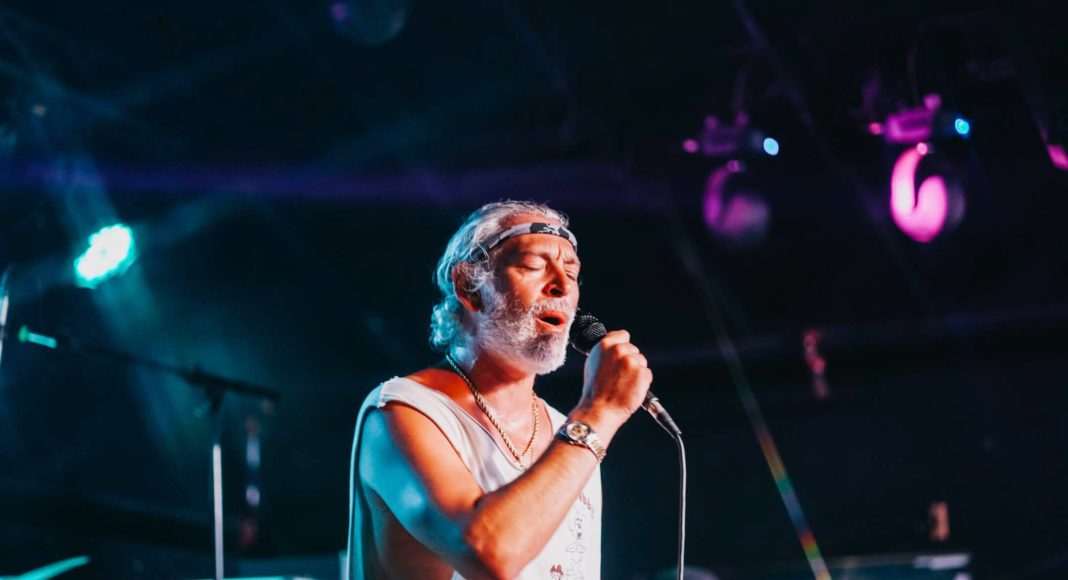Millions and millions have seen the viral clip, but before now no one has heard the deeper story behind it.
The clip reveals a Honolulu coffee shop busker singing the Matisyahu anthem “One Day” when a tall silver-haired stranger in board shorts, a flannel, sandals and a backward hat inches into the frame to harmonize on a few buoyant refrains.
“And our children will play!” the tall man booms between sips of coffee.
After the song closes, the stranger (Matthew Paul Miller, aka Matisyahu) asks the performer (Clint Alama) if he knows who wrote it.
“Matis,” Alama says.
Matisyahu points to himself.
“Nahhh,” the busker scoffs.
When Matisyahu assures Alama it’s him, the recognition sends Alama’s eyebrows high, they clasp hands, and the younger artist concedes, “You look a little different!,” a nod to the reggae headliner’s previous Orthodox Jewish braids and long beard.
“Yeah, man, I shaved,” comes the reply.
What was happening on his interior during that exchange?
“It was a very spiritual thing for me,” Matisyahu says, “because it was a very rough day.”
He describes the preamble to the duet as “one of the worst shows I’ve ever had,” citing sound problems and an audience unenthused by his improvisational phase, then a promoter setting him up with a gorgeous woman who later revealed she was a sex worker planning intercourse and drug use, which he declined.
“Sitting alone in my room after that show was a hard moment, then it was followed with this really cool moment in time,” he says. “It was like, ‘Do the right thing and God will reward you.’”
As Matisyahu approaches two decades in his alt-reggae craft, he says he “feels more alive than ever right now.”
Part of that vivacity is having the chance to tour with his son.
“It’s fun watching him explore his stage presence,” he says. “Helping mentor him is cool.”
Part of that is renewing a connection to his hits.
“For a long time, I just didn’t like ‘One Day’ or ‘King without a Crown,’ songs I once loved and made because no one was making them,” he says. “I had a problem being fake on stage—I’m not good at that—and fans tell me, ‘Whatever space you’re in, it’s real. We like that journey with you’—so I was uncomfortable, rushing through them, changing the feel, and people didn’t like it.
“So I asked myself, ‘What is it that people love about these songs?’ and I listened to them again, paid attention to the little things, remembered singing [songs like] ‘One Day’ for the first time…and I fell back in love.”
And part of that is widening the uplift and lyricism that are Matisyahu hallmarks with fresh bangers like Hold the Fire’s debut single, “Fireproof.”
“It’s a vision, a spiritual concept: There are a lot of flames, how do you move through them?” he says. “How do you keep your ideas intact without being consumed?”
The deep—even defiant—Jewish identity that has long defined him, whether or not he rocks the yarmulke any more, has been catalyzed by the Israeli-Gaza conflict, which gives his catalog and new EP added import.
“The Jewish people have been slaughtered and murdered for thousands of years…[and] the world has a problem with us fighting back,” he says. “The world is OK with Jews being funny or the lawyer or the doctor, but when things get really crazy, they want to see us hiding in the closet rather than fighting back.”
■
In some ways, he admits, the war has brought him from a more serene place to new territory that simultaneously feels familiar.
“I started off with a punk rock attitude—that the world is shallow and full of shit, and I’m going to get into my culture and my people and the history of Torah. As I grew up and became more a part of the world, Jewishness was less important, [my music] became less of a fight, I had less angst, and I focused less on my Jewishness and more on being a human being, being a father, and themes like joy, loss, pain, addiction.”
“Not that I am not thinking about those other things, but when I step out on stage every night it’s at the forefront of my mind. Now, with this [war], I’m back to the original Matisyahu, times 10.”
Wednesday, Feb. 21. 8pm, Felton Music Hall, 6275 Highway 9, Felton. $57adv/$62door. 704-7113.












